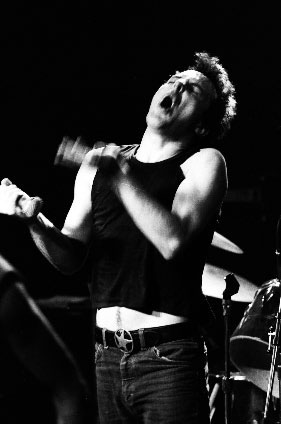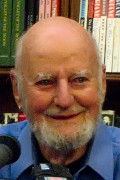|
Anarchopunk
Anarcho-punk (also known as anarchist punk or peace punk) is ideological subgenre of punk rock that promotes anarchism. Some use the term broadly to refer to any punk music with anarchist lyrical content, which may figure in crust punk, hardcore punk, folk punk, and other styles. History Before 1977 Some members of the 1960s protopunk bands such as the MC5, The Fugs, Hawkwind, and the Edgar Broughton Band had new left or anarchist ideology. These bands set a precedent for mixing radical politics with rock music and established the idea of rock as an agent of social and political change in the public consciousness. Other precursors to anarcho-punk include avant-garde art and political movements such as Fluxus, Dada, the Beat generation, England's angry young men (such as Joe Orton), the surrealism-inspired Situationist International, the May 1968 uprising in Paris, and the Campaign for Nuclear Disarmament. Jello Biafra of the Dead Kennedys has cited the Yippies as an influence ... [...More Info...] [...Related Items...] OR: [Wikipedia] [Google] [Baidu] |
Protopunk
Proto-punk (or protopunk) is rock music played mostly by garage bands from the 1960s to mid-1970s that foreshadowed the punk rock movement. The phrase is a retrospective label; the musicians involved were generally not originally associated with each other and came from a variety of backgrounds and styles; together, they anticipated many of punk's musical and thematic attributes. Definition According to the Allmusic guide: Most musicians classified as proto-punk are rock performers of the 1960s and early-1970s, with garage rock/art rock bands Them, the Velvet Underground, the Shaggs, los Saicos, MC5 and the Stooges considered to be archetypal proto-punk artists, along with glam rock band the New York Dolls. Origins and etymology One of the earliest written uses of the term "punk rock" was by critic Dave Marsh who used it in 1970 to describe US group Question Mark & The Mysterians, who had scored a major hit with their song " 96 Tears" in 1966. Many US bands were active ... [...More Info...] [...Related Items...] OR: [Wikipedia] [Google] [Baidu] |
Jello Biafra
Eric Reed Boucher (born June 17, 1958), known professionally as Jello Biafra, is an American singer, spoken word artist and politician. He is the former lead singer and songwriter for the San Francisco punk rock band Dead Kennedys. Initially active from 1979 to 1986, Dead Kennedys were known for rapid-fire music topped with Biafra's sardonic lyrics and biting social commentary, delivered in his "unique quiver of a voice". When the band broke up in 1986, he took over the influential independent record label Alternative Tentacles, which he had founded in 1979 with Dead Kennedys bandmate East Bay Ray. In a 2000 lawsuit, upheld on appeal in 2003 by the California Supreme Court, Biafra was found liable for breach of contract, fraud and malice in withholding a decade's worth of royalties from his former bandmates and ordered to pay over $200,000 in compensation and punitive damages; the band subsequently reformed without Biafra. Although now focused primarily on spoken word performance ... [...More Info...] [...Related Items...] OR: [Wikipedia] [Google] [Baidu] |
Campaign For Nuclear Disarmament
The Campaign for Nuclear Disarmament (CND) is an organisation that advocates unilateral nuclear disarmament by the United Kingdom, international nuclear disarmament and tighter international arms regulation through agreements such as the Nuclear Non-Proliferation Treaty. It opposes military action that may result in the use of Nuclear weapon, nuclear, Chemical warfare, chemical or Biological warfare, biological weapons and the building of nuclear power stations in the UK. CND began in November 1957 when a committee was formed, including Canon John Collins as chairman, Bertrand Russell as president and Peggy Duff as organising secretary. The committee organised CND's first public meeting at Methodist Central Hall, Westminster, on 17 February 1958. Since then, CND has periodically been at the forefront of the peace movement in the UK. It claims to be Europe's largest Single-issue politics, single-issue peace campaign. Between 1958 and 1965 it organised the Aldermaston Marches, Al ... [...More Info...] [...Related Items...] OR: [Wikipedia] [Google] [Baidu] |
May 1968 In France
Beginning in May 1968, a period of civil unrest occurred throughout France, lasting some seven weeks and punctuated by demonstrations, general strikes, as well as the occupation of universities and factories. At the height of events, which have since become known as May 68, the economy of France came to a halt. The protests reached such a point that political leaders feared civil war or revolution; the national government briefly ceased to function after President Charles de Gaulle secretly fled France to West Germany on the 29th. The protests are sometimes linked to similar movements that occurred around the same time worldwide and inspired a generation of protest art in the form of songs, imaginative graffiti, posters, and slogans. The unrest began with a series of far-left student occupation protests against capitalism, consumerism, American imperialism and traditional institutions. Heavy police repression of the protesters led France's trade union confederations to call ... [...More Info...] [...Related Items...] OR: [Wikipedia] [Google] [Baidu] |
Situationist International
The Situationist International (SI) was an international organization of social revolutionaries made up of avant-garde artists, intellectuals, and political theorists. It was prominent in Europe from its formation in 1957 to its dissolution in 1972. The intellectual foundations of the Situationist International were derived primarily from libertarian Marxism and the avant-garde art movements of the early 20th century, particularly Dada and Surrealism. Overall, situationist theory represented an attempt to synthesize this diverse field of theoretical disciplines into a modern and comprehensive critique of mid-20th century advanced capitalism. Essential to situationist theory was the concept of the spectacle, a unified critique of advanced capitalism of which a primary concern was the progressively increasing tendency towards the expression and mediation of social relations through objects. The situationists believed that the shift from individual expression through directly li ... [...More Info...] [...Related Items...] OR: [Wikipedia] [Google] [Baidu] |
Surrealism
Surrealism is a cultural movement that developed in Europe in the aftermath of World War I in which artists depicted unnerving, illogical scenes and developed techniques to allow the unconscious mind to express itself. Its aim was, according to leader André Breton, to "resolve the previously contradictory conditions of dream and reality into an absolute reality, a super-reality", or ''surreality.'' It produced works of painting, writing, theatre, filmmaking, photography, and other media. Works of Surrealism feature the element of surprise, unexpected juxtapositions and '' non sequitur''. However, many Surrealist artists and writers regard their work as an expression of the philosophical movement first and foremost (for instance, of the "pure psychic automatism" Breton speaks of in the first Surrealist Manifesto), with the works themselves being secondary, i.e. artifacts of surrealist experimentation. Leader Breton was explicit in his assertion that Surrealism was, above all, a ... [...More Info...] [...Related Items...] OR: [Wikipedia] [Google] [Baidu] |
Joe Orton
John Kingsley Orton (1 January 1933 – 9 August 1967), known by the pen name of Joe Orton, was an English playwright, author, and diarist. His public career, from 1964 until his death in 1967, was short but highly influential. During this brief period he shocked, outraged, and amused audiences with his scandalous black comedies. The adjective ''Ortonesque'' refers to work characterised by a similarly dark yet farcical cynicism. Early life Orton was born on 1 January 1933 at Causeway Lane Maternity Hospital, Leicester, to William Arthur Orton and Elsie Mary Orton (née Bentley). William worked for Leicester County Borough Council as a gardener and Elsie worked in the local footwear industry until tuberculosis cost her a lung. At the time of Joe's birth William and Mary were living with William's family at 261 Avenue Road Extension in Clarendon Park, Leicester. The same year that Joe's younger brother Douglas was born, 1935, the Ortons moved to 9 Fayrhurst Road on the Saffron Lan ... [...More Info...] [...Related Items...] OR: [Wikipedia] [Google] [Baidu] |
Angry Young Men
The "angry young men" were a group of mostly working- and middle-class British playwrights and novelists who became prominent in the 1950s. The group's leading figures included John Osborne and Kingsley Amis; other popular figures included John Braine, Alan Sillitoe, and John Wain. The phrase was originally coined by the Royal Court Theatre's press officer in order to promote Osborne's 1956 play ''Look Back in Anger''. It is thought to be derived from the autobiography of Leslie Paul, founder of the Woodcraft Folk, whose ''Angry Young Man'' was published in 1951. Following the success of the Osborne play, the label "angry young men" was later applied by British media to describe young writers who were characterised by a disillusionment with traditional British society. The term, always imprecise, began to have less meaning over the years as the writers to whom it was originally applied became more divergent, and many of them dismissed the label as useless. John Osborne The playw ... [...More Info...] [...Related Items...] OR: [Wikipedia] [Google] [Baidu] |
Beat Generation
The Beat Generation was a literary subculture movement started by a group of authors whose work explored and influenced American culture and politics in the post-war era. The bulk of their work was published and popularized by Silent Generationers in the 1950s, better known as Beatniks. The central elements of Beat culture are the rejection of standard narrative values, making a spiritual quest, the exploration of American and Eastern religions, the rejection of economic materialism, explicit portrayals of the human condition, experimentation with psychedelic drugs, and sexual liberation and exploration. Allen Ginsberg's ''Howl'' (1956), William S. Burroughs' ''Naked Lunch'' (1959), and Jack Kerouac's ''On the Road'' (1957) are among the best known examples of Beat literature.Charters (1992) ''The Portable Beat Reader''. Both ''Howl'' and ''Naked Lunch'' were the focus of obscenity trials that ultimately helped to liberalize publishing in the United States.Ann Charters, ''int ... [...More Info...] [...Related Items...] OR: [Wikipedia] [Google] [Baidu] |
Dada
Dada () or Dadaism was an art movement of the European avant-garde in the early 20th century, with early centres in Zürich, Switzerland, at the Cabaret Voltaire (Zurich), Cabaret Voltaire (in 1916). New York Dada began c. 1915, and after 1920 Dada flourished in Paris. Dadaist activities lasted until the mid 1920s. Developed in reaction to World War I, the Dada movement consisted of artists who rejected the logic, reason, and aestheticism of modern capitalist society, instead expressing nonsense, irrationality, and anti-bourgeois protest in their works. The art of the movement spanned visual, literary, and sound media, including collage, sound poetry, cut-up technique, cut-up writing, and sculpture. Dadaist artists expressed their discontent toward violence, war, and nationalism, and maintained political affinities with Radical politics, radical left-wing and far-left politics. There is no consensus on the origin of the movement's name; a common story is that the German artis ... [...More Info...] [...Related Items...] OR: [Wikipedia] [Google] [Baidu] |
Fluxus
Fluxus was an international, interdisciplinary community of artists, composers, designers and poets during the 1960s and 1970s who engaged in experimental art performances which emphasized the artistic process over the finished product. Fluxus is known for experimental contributions to different artistic media and disciplines and for generating new art forms. These art forms include intermedia, a term coined by Fluxus artist Dick Higgins; conceptual art, first developed by Henry Flynt, an artist contentiously associated with Fluxus; and video art, first pioneered by Nam June Paik and Wolf Vostell. Dutch gallerist and art critic describes Fluxus as "the most radical and experimental art movement of the sixties".. 1979. ''Fluxus, the Most Radical and Experimental Art Movement of the Sixties'' Amsterdam: Editions Galerie A. They produced performance "events", which included enactments of scores, "Neo-Dada" noise music, and time-based works, as well as concrete poetry, visual art, ... [...More Info...] [...Related Items...] OR: [Wikipedia] [Google] [Baidu] |



_by_Erling_Mandelmann.jpg)


